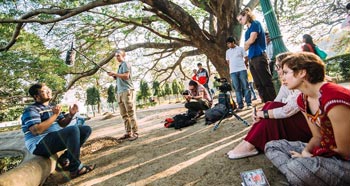ETL’s latest documentary opens April 19 and April 23, tackles issue of spiritual and cultural significance of water
April 13, 2018
By Mike Killeen; Photos by Maggie Grunow '18
When Native American groups protested the Dakota Access Pipeline and the Keystone XL Pipeline, members of Extending the Link (ETL) took notice.
“We saw all these native groups screaming water is life, water is spirit, you cannot be doing this to our water — and it was being completely ignored,” said Grace Lindquist, a College of Saint Benedict senior chemistry major from Detroit Lakes, Minnesota, who has been a member of ETL for three years.
ETL used that as inspiration for its 11th documentary, “Nibi Eteg: Where the Water Is” (Nibi eteg means where the water is in Ojibwe). ETL has put together a trailer of the film.
The documentary makes its debut at 7:30 p.m. Thursday, April 19, at Saint John’s University’s Stephen B. Humphrey Theater. A second showing is at 5:30 p.m. Monday, April 23, at Alumnae Hall, Haehn Campus Center, CSB (see story, right, for more details on each showing). Both events are free and open to the public.
“We are sharing the stories of the Red Lake Band of Chippewa Indians and the people whose lives revolve around the Ganges River in India,” Lindquist said.
Extending the Link is a nonprofit, student-run venture through CSB and SJU and the Donald J. McNeely Center for Entrepreneurship. The group has covered a wide range of topics over the years, including fair-trade coffee in Guatemala, micro-lending in Chile and child-headed households in Uganda.
The protests by Native American groups against the two pipeline projects sparked their interest in the spiritual and cultural significance of water.
“We started exploring, and we saw that idea of water (being sacred) is very present in a lot of groups,” said Lindquist, who is co-director of this year’s documentary along with SJU senior Brennan Lafeber. “We took that inspiration to India, where the Ganges River is the life and spirit of that country.
“The Hindu religion, as well as many other connected religions, through a cremation process at death, you are cast into the river, and that is what carries you into the afterlife. Without that water, without that river, you don’t receive moksha, or salvation,” Lindquist said.
 ETL members visited the Red Lake Band of Chippewa Indians in northern Minnesota over long weekend in October. They heard about the medicine wheel and the belief that all four elements — water, air, fire and earth — are connected.
ETL members visited the Red Lake Band of Chippewa Indians in northern Minnesota over long weekend in October. They heard about the medicine wheel and the belief that all four elements — water, air, fire and earth — are connected.
“That’s where the story really started to come together. They gave us our initial interviews, and kind of set the direction of where we were going,” Lindquist said.
Then, six members of ETL and faculty sponsor Matt Callahan, visiting assistant professor of English at CSB and SJU, traveled to India over semester break, based in Kolkata at St. Xavier’s University. Other stops included a day trip to Gangasagar, a “very holy site” where the Ganges River empties into the Bay of Bengal. They also visited Varanasi, a city said to be founded by Lord Shiva and “very important to the Hindu religion,” she added.
ETL’s theme is “Think Globally, Act Locally.”
“That’s the beauty of this topic, is the local portion can be really whatever you want it to be,” Lindquist said. “It could be to learn more about the native tribes here and how they view water. It could be how you personally connect to water, and what you can do preserve water more – how can you better respect water in your own life.
“A large part of the takeaway was general education, and becoming aware of issues and applying it (to your life). But, there are so many routes you can take to make that change within your mind,” Lindquist said.

